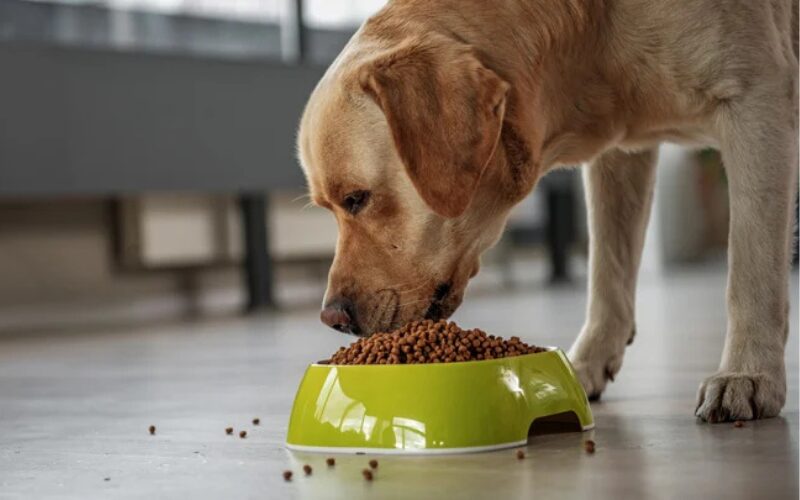Choosing the best nutrition for your dog can be a daunting task, but it’s crucial for their overall health and well-being. With so many options available, it’s essential to understand your dog’s unique nutritional requirements and how to select the most appropriate food for them. In this guide, we’ll dive deep into the world of canine nutrition, exploring the key factors to consider when making this important decision.
From understanding the role of essential nutrients to deciphering ingredient labels, we’ll provide you with the knowledge and tools necessary to make informed choices about your dog’s diet. Whether you have a puppy, adult, or senior dog, this guide will help you navigate the complexities of dog nutrition and ensure your beloved companion receives the best possible nourishment. So, let’s embark on this journey together and discover how to choose the ideal nutrition for your dog’s specific needs.
As a loving dog owner, you want the best for your dog, and that starts with providing them with the right nutrition. Choosing the best dog food is crucial for maintaining your pet’s health, energy levels, and overall well-being. However, with so many options available in the market, it can be overwhelming to decide what’s best for your canine friend.
When selecting dog food, there are several factors to consider, such as your dog’s age, breed, size, activity level, and any specific health concerns. It’s essential to choose a high-quality, balanced diet that meets your dog’s nutritional requirements and suits their individual needs. This comprehensive guide aims to help you navigate the world of dog nutrition, making it easier for you to make informed decisions about what to feed your beloved pet.
In this guide, we’ll explore the importance of proper nutrition for dogs, discuss the various types of dog food available, and provide tips on how to read and understand dog food labels. We’ll also delve into specific dietary considerations for different life stages and health conditions, ensuring that you have the knowledge to keep your dog happy, healthy, and thriving.

Understanding Dog Nutrition
Providing your dog with the right nutrition is crucial for their overall health and well-being. Dogs require a balanced diet that includes essential nutrients such as proteins, fats, carbohydrates, vitamins, and minerals. However, the specific nutritional needs of dogs can vary based on factors like age, size, and breed.
Puppies, for example, require a diet higher in calories and protein to support their rapid growth and development. Senior dogs, on the other hand, may benefit from a diet lower in calories and fat to maintain a healthy weight and prevent age-related health issues. Large breeds and small breeds also have different nutritional requirements, with large breeds needing a diet that supports healthy bone growth and joint health.
When it comes to choosing the best food for your dog, it’s important to be aware of common misconceptions. Many people believe that dogs should eat a high-protein diet, but in reality, excessive protein can be harmful to some dogs, especially those with kidney or liver problems. Another misconception is that dogs should avoid grains, but whole grains can actually be a healthy source of carbohydrates and fiber for many dogs.
To ensure your dog is getting the nutrition they need, look for a high-quality, balanced dog food that meets their specific requirements. Consult with your veterinarian to determine the best diet for your dog, and always provide fresh, clean water to keep them hydrated and healthy.
Types of Dog Food
When it comes to choosing the best dog food, there are several options available, each with its own pros and cons. The most common types of dog food include:
Dry Kibble
Dry kibble is the most popular type of dog food. It’s convenient, affordable, and has a long shelf life. Kibble is designed to provide a balanced diet, but the quality can vary greatly between brands. Look for high-quality ingredients and avoid fillers like corn and wheat.
Wet or Canned Food
Wet or canned dog food has a higher moisture content, which can be beneficial for dogs with urinary tract issues or those who don’t drink enough water. It’s also more palatable for picky eaters. However, it’s more expensive and has a shorter shelf life than dry kibble.
Raw Food Diets
Raw food diets consist of uncooked meat, bones, fruits, and vegetables. Proponents believe it’s a more natural and healthier option for dogs. However, there are risks associated with raw diets, such as bacterial contamination and nutritional imbalances. It’s crucial to consult with a veterinarian before starting a raw food diet.
Homemade Dog Food
Some dog owners prefer to make their own dog food to have complete control over the ingredients. Homemade diets can be tailored to a dog’s specific needs, but it’s important to ensure the diet is balanced and meets all nutritional requirements. Consult with a veterinary nutritionist to create a proper homemade diet plan.
Reading Dog Food Labels
When it comes to choosing the best nutrition for your dog, reading dog food labels is important. Start by understanding the guaranteed analysis, which provides information on the minimum percentages of crude protein and fat, and the maximum percentages of crude fiber and moisture. Next, decipher the ingredient list, paying attention to the first few items, as they make up the majority of the food. Look for quality protein sources like whole meats, such as chicken, beef, or fish, and avoid generic terms like “meat meal” or “animal by-products.” Be cautious of harmful ingredients, including artificial colors, flavors, and preservatives, as well as fillers like corn, wheat, and soy, which can trigger allergies in some dogs. By carefully examining dog food labels, you can ensure that you’re providing your canine companion with the best possible nutrition for a happy and healthy life.
Choosing the Right Food for Your Dog
When it comes to selecting the best dog food, it’s crucial to consider your dog’s unique needs. Factors such as age, breed, size, and activity level all play a role in determining the ideal nutrition for your pup. Consulting with your veterinarian is a great way to ensure you’re making the right choice, as they can provide personalized recommendations based on your dog’s health and dietary requirements.
Once you’ve chosen a high-quality dog food, it’s important to transition gradually to avoid digestive upset. Mix the new food with your dog’s current diet, slowly increasing the proportion of new food over the course of a week or two. Keep an eye out for signs of a healthy diet, such as:
- Shiny, healthy coat
- Bright, clear eyes
- Plenty of energy
- Solid, well-formed stools
By taking the time to select the right food and monitor your dog’s response, you’ll be setting them up for a lifetime of optimal health and happiness.

Supplements and Treats
When it comes to providing the best nutrition for your dog, supplements and treats can play a crucial role. If your dog has specific health needs or dietary deficiencies, your veterinarian may recommend incorporating supplements into their diet. Look for high-quality supplements that target your dog’s unique requirements, such as joint support, skin and coat health, or digestive aids.
Treats are a great way to reward your dog and strengthen your bond, but it’s essential to choose healthy options. Opt for treats that are low in calories and made with wholesome ingredients. Many pet stores now offer a wide variety of natural and organic treats, such as freeze-dried meats, dental chews, and veggie-based snacks.
When giving treats, be mindful of portion sizes to avoid overfeeding. Treats should make up no more than 10% of your dog’s daily caloric intake. You can also use treat time as an opportunity to support your dog’s oral health by offering dental chews or toys that promote chewing and help remove plaque and tartar buildup.
Remember, while supplements and treats can be beneficial, they should never replace a well-balanced diet. Always consult with your veterinarian before making significant changes to your dog’s nutrition plan to ensure you’re providing the best possible care for your loyal companion.
Common Nutritional Issues
When it comes to your dog’s health, nutrition plays a crucial role. However, even with a balanced diet, dogs can experience various nutritional issues. Food allergies and sensitivities are common problems, causing symptoms like itching, skin irritation, and digestive upset. If you suspect your dog has a food allergy, work with your vet to identify the trigger and find a suitable hypoallergenic diet.
Obesity is another prevalent nutritional issue in dogs. Overweight dogs are at higher risk for health problems such as joint pain, diabetes, and heart disease. To manage your dog’s weight, provide a balanced diet, control portion sizes, and ensure regular exercise. Consult your vet to determine your dog’s ideal weight and develop a weight management plan.
Digestive problems, such as diarrhea, vomiting, and constipation, can also stem from nutritional imbalances. These issues may be caused by a sudden change in diet, food intolerances, or underlying health conditions. If your dog experiences persistent digestive issues, it’s essential to consult your veterinarian. They can help identify the cause and recommend appropriate dietary changes or treatments.
Addressing nutritional issues promptly is key to maintaining your dog’s overall health and well-being. Regular check-ups with your vet can help identify potential problems early on, allowing for timely interventions and dietary adjustments. By staying informed and proactive about your dog’s nutritional needs, you can help ensure a long, healthy, and happy life for your dog.
Myths and Facts About Dog Nutrition
When it comes to your dog’s nutrition, it’s essential to separate fact from fiction. One common myth is that dogs are strictly carnivores. In reality, dogs are omnivores and can benefit from a balanced diet that includes carbohydrates and other nutrients.
Grain-free diets have gained popularity in recent years, but they may not be suitable for all dogs. While some canines with specific allergies or sensitivities may thrive on a grain-free diet, grains can provide valuable nutrients and energy for many dogs. It’s crucial to consult with your veterinarian to determine the best diet for your individual dog’s needs.
Carbohydrates play a vital role in a balanced dog food formula. They provide energy, fiber, and essential nutrients. However, not all carbs are created equal. Look for high-quality, digestible carbohydrate sources like brown rice, oats, or sweet potatoes.
The Importance of Hydration
Proper hydration is just as crucial as the food you choose for your dog. Always provide fresh, clean water for your dog. Some key facts about hydration include:
- Dogs should consume about 1 ounce of water per pound of body weight daily
- Hydration needs may increase with activity level, age, and environmental factors
- Moisture-rich foods like wet dog food can contribute to overall hydration
By understanding the facts behind dog nutrition and debunking common myths, you can make informed decisions to keep your four-legged friend healthy and happy.
Conclusion
Providing your dog with the best nutrition is essential for their health and happiness. By understanding the fundamentals of dog nutrition, exploring various types of dog food, and learning how to read labels, you can make informed decisions about your pet’s diet. Remember to consider your dog’s unique needs, including age, breed, and activity level, when selecting their food. Supplements and treats can be beneficial, but should be given in moderation. Stay informed about common nutritional issues and be cautious of myths surrounding dog nutrition. With this comprehensive guide, you’re well-equipped to choose the best food for your beloved canine companion, ensuring they thrive and live their best life by your side.

